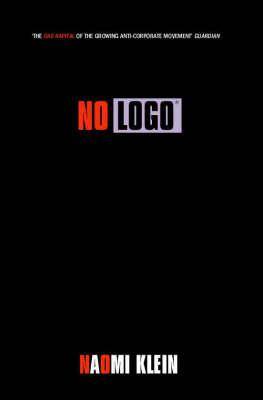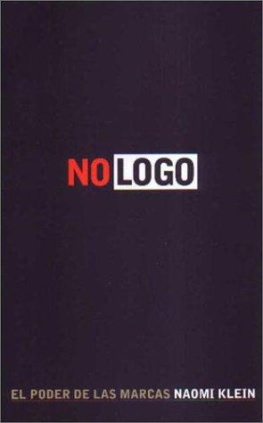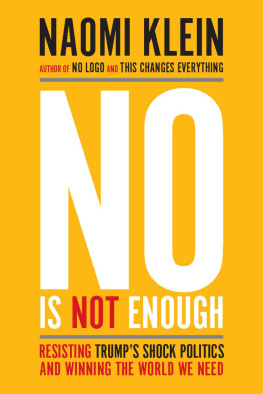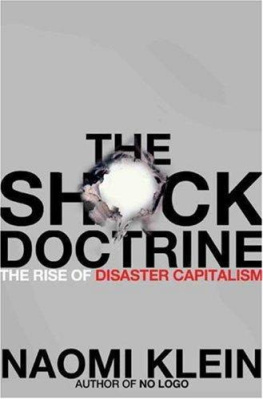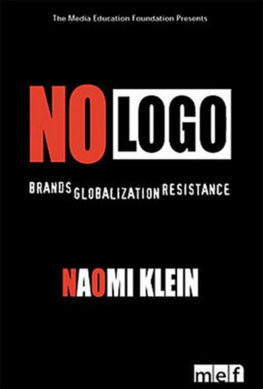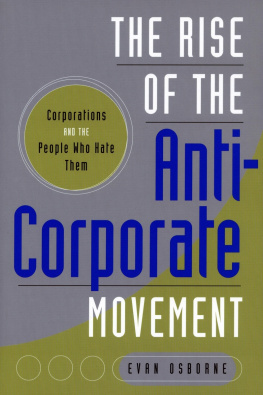Acknowledgments
The four-year process of taking No Logo from an idea to a finished book has been exhilarating. It has not, however, been painless and I have relied heavily on the support, understanding and expertise of those around me.
It has been my great honor to have as my editor Louise Dennys, whose intellectual rigor and personal commitment to freedom of expression and human rights have sharpened the arguments in this book and smoothed my rough edges as a writer. She transformed this book in magical ways.
My research assistant, Paula Thiessen, has tracked down many of the most obscure facts and sources. For more than two years she worked tirelessly collecting the statistics that make up this books many original charts, extracting facts from cagey retail chains and cajoling government agencies around the world to send unpublished reports. She also conducted the books photo research and has been a calming influence and supportive colleague during what is often lonely work.
My agents at the Westwood Creative Artists, Bruce Westwood and Jennifer Barclay, took on what many would have seen as a risky project, with boundless enthusiasm and determination. They searched the international book world for kindred spirits who would not just publish No Logo , but would champion it: Reagan Arthur and Philip Gwyn Jones.
The exceptional team at Knopf Canada has been warm-hearted and cool-headed no matter what the crisis. I am grateful to Michael Mouland, Nikki Barrett, Noelle Zitzer and Susan Burns, as well as to the talented and dedicated team of editors who have strengthened, polished, trimmed and checked this text: Doris Cowan, Alison Reid and Deborah Viets.
I am deeply indebted to John Honderich, publisher of The Toronto Star , who gave me a regular column in his newspaper when I was far too young; a space that for almost five years allowed me to develop both the ideas and the contacts that form the foundation of this book. My editors at The Star Carol Goar, Haroon Siddiqui and Mark Richardsonhave been enormously supportive through leaves of absence and even wished me well when I left the column to focus my full attention on this project. The writing for No Logo began in earnest as a piece for The Village Voice on culture jamming and I am indebted to Miles Seligman for his editorial insights. My editor at Saturday Night , Paul Tough, has supported me with extended deadlines, research leads, and No Logo themed assignments, including a trip to the Roots Lodge, which helped deepen my understanding of the utopian aspirations of branding.
I received valuable research assistance from Idella Sturino, Stefan Philipa and Maya Roy. Mark Johnston hooked me up in London, Bern Jugunos did the same in Manila and Jeff Ballinger did it in Jakarta. Hundreds of individuals and organizations also cooperated with the research, but a few individuals went far out of their way to ply me with stats and facts: Andrew Jackson, Janice Newson, Carly Stasko, Leah Rumack, Mark Hosler, Dan Mills, Bob Jeffcott, Lynda Yanz, Trim Bissell, Laird Brown, and most of all, Gerard Greenfield. Unsolicited juicy tidbits arrived by post and E-mail from Doug Saunders, Jesse Hirsh, Joey Slinger, Paul Webster and countless other electronic angels. The Toronto Reference Library, the International Labour Organization, the Corporate Watch Web site, the Maquila Solidarity Network, The Baffler , SchNEWS, Adbusters and the Tao Collective listserves were all invaluable to my research.
I am also grateful to Leo Panitch and Mel Watkins for inviting me to speak at conferences that helped me to workshop the thesis early on, and to my colleagues on the This Magazine editorial board for their generosity and encouragement.
Several friends and family members have read the manuscript and offered advice and input: Michele Landsberg, Stephen Lewis, Kyo Maclear, Cathie James, as well as Bonnie, Michael, Anne and Seth Klein. Mark Kingwell has been a dear friend and intellectual mentor. Sara Borins was my first and most enthusiastic readerof both the proposal and the first draftand it was the ever-fabulous Sara who insisted that No Logo must have a design that matched the spirit of its content. Nancy Friedland, John Montesano, Anne Baines and Rachel Giese stood by me when I was nowhere to be found. My late grandfather, Philip Klein, who worked as an animator for Walt Disney, taught me a valuable lesson early in life: always look for the dirt behind the shine.
My greatest debt is to my husband, Avi Lewis, who for years greeted me every morning with a cup of coffee and a stack of clippings from the business section. Avi has been a partner in this project in every possible way: he stayed up late into the night helping to evolve the ideas in this book; accompanied me on numerous research escapades, from suburban monster malls to Indonesias export factory zones; and edited the manuscript with centurion attention at multiple stages. For the sake of No Logo he allowed our lives to be totally branded by this book, giving me the great freedom and luxury to be fully consumed.
Naomi Klein is an award-winning journalist, author and filmmaker. Her most recent book, The Shock Doctrine: The Rise of Disaster Capitalism , was a New York Times and number-one international bestseller; it is being translated into twenty-seven languages. She writes an internationally syndicated column for The Nation and The Guardian (UK), is a contributing editor at Harpers and a reporter for Rolling Stone . In 2004, she released The Take , a feature documentary about Argentinas occupied factories, coproduced with director Avi Lewis. She is a former Miliband Fellow at the London School of Economics and holds an honorary Doctor of Civil Law degree from the University of Kings College, Nova Scotia.
Conclusion
Consumerism Versus Citizenship
The Fight for the Global Commons
The beers at my hotel bar in Rosario were blissfully cold, and the gang from the Workers Assistance Center were all getting a little drunk. We were arguing, once again, about whether codes of conduct have any merit whatsoever. Zernan Toledo (who personally favors armed revolutionits just a question of when) pounded the table. These documents are written by the transnational corporations, so they will only serve the transnational corporationshavent you read Marx?
Its different now, I countered. With globalization, there need to be some common standardsand the governments certainly arent setting them.
Globalization is nothing new. We have always had globalization, said Arnel Salvador, another of the WAC organizers. His eyes were fixed not on me, but on something across the bar. Since the hotel where I stayed is the only one near the Cavite Export Processing Zone, it was, as usual, packed with visiting factory owners, contractors and buyers who were here to stay up all night singing karaoke and cutting deals for cheap clothes and electronics. I followed Arnels eyes to a young man slouched in his chair, his feet up on the table across from him, his knees splayed apart as if he owned the world. Trendy and modern, he looked like a character from one of the many cell-phone commercials on Asian TV. You can always tell the foreigners, Arnel said slowly, his usually warm voice icy. No Filipino would sit like that.
The foreign investors who sing karaoke at the Mountain and Sea Hotel in Rosario are part of a long and bitter history of colonialists in the Philippines: first the Spaniards came and conquered, then the Americans arrived, setting up army bases and turning teenage prostitution into one of the countrys largest industries. Now colonialism is dead, the U.S. military has receded and the new imperialists are the Taiwanese and Korean contractors in the export processing zones, sexually harassing the eighteen-year-old Filipinas on the assembly lines. Several of the free-trade zones in the Philippines (though not Cavite) are actually built on land that only a few years back housed U.S. military bases, and all over the country workers are shuttled to and from the zones in U.S. army jeeps converted into mini-buses. To Arnel Salvador and Zernan Toledo, the much-vaunted joys of economic globalization amount to pretty much more of the same: the boss has just traded in his military uniform for an Italian suit and an Ericsson cell phone.

